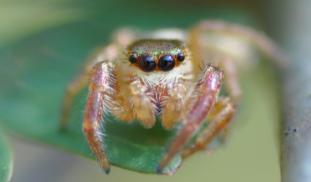106
1
0
Like?
Please wait...
About This Project
The spider Bagheera kiplingi is 90% vegetarian in Mexico, and 60% vegetarian in Costa Rica. I will test if population density causes this difference by documenting population density of spiders in both countries and artificially increasing the number of spiders per plant in Costa Rica to compare with results in Mexico. In Panama, I will video record and collect samples of Frigga crocuta, which exhibits similar habits to B. kiplingi and might also be vegetarian.

Browse Other Projects on Experiment
Related Projects
Out for blood: Hemoparasites in white-tailed deer from the Shenandoah Valley in Northern Virginia
Our research question centers about the prevalence and diversity of hemoparasites that infect ungulate poplulations...
Using eDNA to examine protected California species in streams at Hastings Reserve
Hastings Reserve is home to three streams that provide critical habitat for sensitive native species. Through...
How do polar bears stay healthy on the world's worst diet?
Polar bears survive almost entirely on seal fat. Yet unlike humans who eat high-fat diets, polar bears never...

